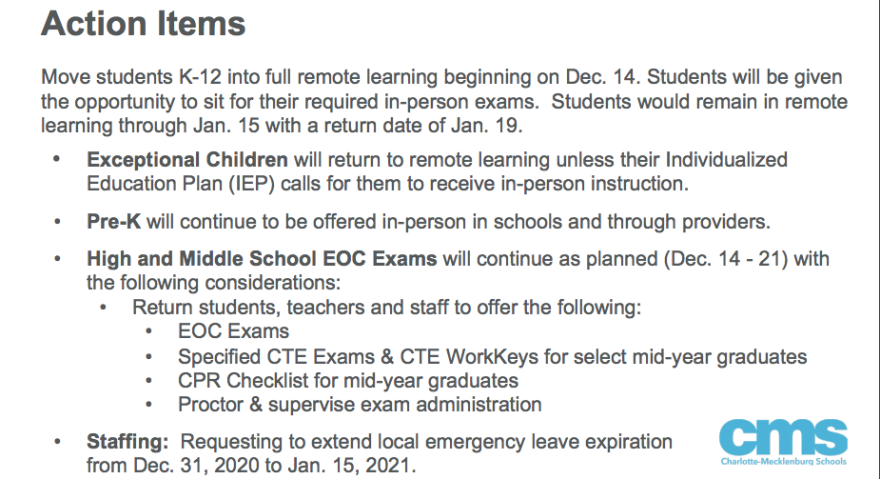The Charlotte-Mecklenburg school board voted Tuesday to return K-12 students to all-remote learning from Dec. 14 to Jan. 15. Officials say they hope the break from in-person classes provides some protection from community spread of COVID-19.
The board voted 6-3 for Superintendent Earnest Winston’s plan to take a break from in-person classes around the holidays. He said rising community spread and an increase in COVID-19 cases in schools make that the wisest route.
"Simply put, we believe it is in our best interest — again, for the health and safety of our students — to return to remote instruction," he said.
That means elementary and K-8 schools will stop in-person classes a week before the holiday break. Middle and high schools, which were scheduled to reopen Jan. 5, will wait to start their in-person rotations Jan. 19.
The only students who will remain in person next week are some students with disabilities whose learning plans require that setting, and 4-year-olds in public prekindergarten.
"Our pre-K students are least at risk of contracting COVID, but they are greatest at risk in loss of education," Deputy Superintendent Matt Hayes said.
Hayes said teachers whose students have been sent home will have the option of working from home. The board voted to extend a local emergency leave plan to Jan. 15 to help hourly workers whose jobs depend on in-person attendance.
An Alternative To In-Person Exams
Some middle and high school students will report to their schools next week to take exams where in-person testing is required by the federal government. Hayes says students will have the option of taking an “incomplete” for those courses and taking the test at a makeup date sometime before June 1.
"Basically what we’ve done is we’ve tried to provide maximum flexibility for our students," he said.

There’s no doubt that COVID-19 cases are surging in Mecklenburg County and across the country; on Tuesday, the county reported 11% of coronavirus tests were positive, a significant increase. Tuesday night’s board discussion centered on whether bringing students and staff into schools exacerbates that spread or whether the increase in school cases merely reflects the community spread.
Debate lasted more than four hours and drew more than 4,000 online viewers. Passions ran high on both sides, with dueling online petitions. Parents and students held an afternoon rally at an uptown park to urge the board to keep kids in classrooms.
Melissa Woodruff was among the parents who made that case at the board meeting. "We cannot and should not allow our children's education to become one more victim of COVID-19," she said.
Temeka Truesdale, a teacher recovering from COVID-19, was among those who urged the board to return to full remote learning. She said teachers want to be in classrooms helping students make up for lost time, "but we are afraid of contracting a virus that can potentially kill us."
Limited Spread In Schools
Dr. Meg Sullivan, medical director for the Mecklenburg Health Department, talked about working with CMS to track the source and spread of COVID-19 cases connected to schools. CMS has reported 301 staff cases and 163 student cases since October. But none have been classified as clusters, which would indicate five or more people caught the disease at school.
"What we are seeing here locally, and then around the state and the country, we’re not seeing significant evidence that the school is the source of the case," Sullivan said.
Board member Rhonda Cheek asked Sullivan whether sending students home might increase community spread.
"The risk of transmission really depends on the activities that people are engaged in," Sullivan said.
Cheek and colleagues Sean Strain and Margaret Marshall voted against the changes. They argued that the evidence doesn’t support closing schools, especially for elementary students.
Strain asked the superintendent to justify taking drastic measures, rather than continuing to use quarantines or even closing individual schools to control spread.
"We do not have broad transmission in our schools. We don’t even have broad transmission in a classroom, and yet you’re recommending imposing further remote learning on our youth," he said.
Safety Comes First
Winston acknowledged there are academic costs to disrupting in-person classes: "We’re seeing an increasing number of students who are struggling academically. We recognize that."
But he said the need to restrict contact among rising numbers was more important. The majority of the board agreed — and so did Gabe Schuhl, an Ardrey Kell senior who’s the board’s nonvoting student adviser.
"Students are saying that they hate online learning, that they are struggling with online learning," he said. "And yet they’re also scared, and fearful of going to school with increased positivity rates, with increased hospitalizations, with county health officials that are telling us that we should do every measure possible to stop community spread."
The latest plan calls for all schools to start in-person rotations on Jan. 19. That provides two weeks of remote classes after winter break — enough time, officials hope, to see whether the holidays spark another surge.
Students in elementary and K-8 schools will return to their rotations of two days a week in class and three days learning from home.
Middle and high schools will split students into three groups to allow safe distancing. They'll attend in three-week cycles, with each group attending one week in person and learning from home the other two weeks. That means some older students won't return to their schools until Feb. 1.



